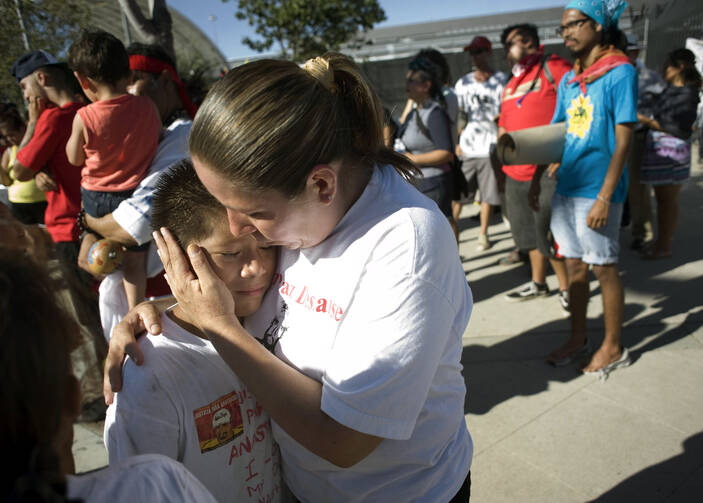A federal judge in California ruled on Friday that the Obama administration's family detention policy violates a 1997 settlement that bars immigrant children from being held in unlicensed facilities. In response to a surge at the border of immigrants fleeing violence and poverty in Central America U.S. Immigration and Customs Enforcement expanded the number of detention facilities to house up to 3,700 unaccompanied minors and mothers with young children (1,700 are currently being held). The earlier settlement requires that immigration officials seek to minimize the detention of children and release those that can be placed with family member or custodians in the United States. U.S. District Judge Dolly Gee wrote, "It is astonishing that Defendants have enacted a policy requiring such expensive infrastructure without more evidence to show that it would be compliant with an Agreement that has been in effect for nearly 20 years."
The ruling does not, however, mean these families can expect immediate release. The judge gave the administration until August 3 to file a response and the Department of Homeland Security is expected to appeal the decision. Lawyers working with detained women and children do expect the ruling to improve conditions with the detention centers. Jonathan Ryan, an immigration lawyer, told the L.A. Times, "They're going to continue to detain families. This sets minimal standards for how they detain those families."
Even before this ruling, the administration was under fire for its detention policy. In June members of Congress visited facilities in Texas where they met traumatized women and sick children kept in "prison-like" conditions.
Jeanne Atkinson, the director of the Catholic Legal Immigration Network, has said "It is harmful to the physical and mental health of these mothers and their children, who come to the United States fleeing unspeakable violence and trauma to be isolated from the family or other emotional support they desperately need. There is simply no humane way to detain families."
In an editorial published in March, our editors agreed, writing that "a policy that relies on detention of families is fundamentally flawed" and calling for a less restrictive monitoring system for immigrants seeking asylum:
Alternative detention programs, which range from nonprofit residential facilities to monitoring programs that include curfews and regular check-ins, meet many needs. They allow women to seek legal help while their children receive schooling and other basic services. At federal detention centers, families do not have ready access to lawyers, whose help has been shown to greatly increase chances of gaining legal asylum. According to one study, detainees placed in a well-managed monitoring program had a court appearance rate of 93 percent.
Pope Francis has placed the plight of migrants at the center of his public witness. Speaking of Lampedusa, the first stop in Europe for many Africa migrants, the pope asked, "Has any one of us wept for these persons who were on the boat? For the young mothers carrying their babies? For these men who were looking for a means of supporting their families? We are a society which has forgotten how to weep, how to experience compassion."
Bishop Eusebio Elizondo, chairman of the USCCB Committee on Migration, has called the U.S.-Mexico border "our Lampedusa." Ahead of Pope Francis' visit to the United States in September, may we take up his call to weep for those who seek refuge in our immigrant nation and not compound their suffering within an outdated and inhumane detention system.








